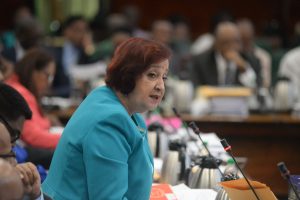…PPP fails in bid to restore adjustments
The Opposition on Monday failed to restore adjustments made to the budgets of several constitutional agencies during a testy sitting that was interrupted by a two-hour suspension of the House.
In the end the National Assembly approved over $11B for the 2019 fiscal year for the bodies. Minister of Finance Winston Jordan, in his presentation of the current and capital estimates of the constitutional agencies, provided comparative data on the requests of the agencies; the recommendation of the Government and how it compares with previous allocations.
Although $1.845B was requested for the Parliament Office, the sum of $1.700B was approved which Jordan stated is 92 per cent of the requested amount and some 13 per cent above what was given in 2017.
Prior to its approval, the figure was met with resistance from Opposition Chief Whip Gail Teixeira who questioned the cut of some $145M from what she referred to as the country’s “highest supreme law making body”.
There was also objection from Opposition MP Juan Edghill who questioned whether specific forms were filled out by the budget agencies and whether these forms aided Jordan in the arrival at his decision.
In response Jordan stated that the figure recommended takes into consideration the economic outlook for 2019; revenue; expenditure; growth in the economy; the annualisation of salaries and the overall national development.
The economic outlook for 2019, he expounded, is positive economic growth and while the Government anticipates a slight increase in revenue, he said expenses were high and the various agencies have to exercise good financial management.
Edghill also queried whether the minister could give the assurance that, after one month, the lump sums being approved would be transferred to the constitutional agencies in keeping with the law. To this Jordan responded: “The law requires that and we follow the law strictly”, adding that the amount budgeted for constitutional agencies in the past is exactly what the agencies have collected over the years.
Audit spending
Meanwhile the sum requested for the Office of the Auditor General was $894M but a sum of $872M was approved. Opposition MP Irfaan Ali questioned whether the sum was adequate taking into consideration the impending oil and gas sector; the new capital projects coming on stream and the country’s growing capital budget. Jordan rebutted by providing statistics which show that the $872M represents 98 per cent of the requested sum and is 16 per cent more than what was allocated in 2017.
When asked to indicate the considerations taken into account when the deductions were made to the sum proposed, the Finance Minister reiterated that these were the economic outlook of 2019, expenditure; revenue; growth in the economy and the annualisation of salaries.
When challenged, Jordan added that he does not believe that the sum being recommended will restrict the Office of the Auditor General from conducting its duties or maintaining its staffing. Before the sum of $5.317B was approved for the Guyana Elections Commission (GECOM) as opposed to the $6.368B requested, there were questions from the Opposition on how the figure would cater for house-to-house registration planned for the New year by GECOM.
In response, Jordan stated that the sum is roughly 84 per cent of the requested amount and almost double what the Commission was allocated in 2018. He stated his position that the 16 per cent reduction of the amount requested would not interfere with the smooth conduct of the house-to-house registration planned by GECOM.

Meanwhile, Opposition MP Anil Nandlall, when the sum recommended for the Supreme Court of Judicature by Jordan was stated as $2.308B, recalled instances in which the Government returned to the House for the approval of additional funds. Nandlall therefore questioned why the sum being suggested accounted for an over $500M reduction from the requested figure of $2.801B.
Jordan clarified that the cases of requests made by his Administration for additional funds involved the employment of magistrates and judges of the Court of Appeal which the Government has no control over.
The Opposition then switched things around when Nandlall questioned the lack of reduction of the budget recommended for the chambers of the Director of Public Prosecutions which remained as requested by the agency at $219M. This, however was bypassed when the House granted the approval as requested by the agency which was viewed by Jordan as sufficient amount.
On the Government’s recommended $194M for the Ethnic Relations Commission, the Opposition highlighted the some $84M reduction and the over $29M supplementary that the Commission recently benefited from.
Prior to its approval, Jordan stated that this represents an increase of 275 per cent on budget 2017. The sum of $146M was also approved for the Public and Police Service Commissions which Jordan stated is 94 per cent of the requested amount and 62 per cent above the 2017 allocation.
Then, with Minster Jordan recommending the sum of some $34M for the Human Rights Commission Teixeira questioned the increase of a budget for a commission she referred to as “non-existent”. Teixeira queried when the rights commission would be constituted arguing that she had been raising this issue for the past two years. The body came into being under the PPP but was never constituted. The sum was nonetheless approved by the House.
Other approvals included: $109M was approved uncontested for the Teaching Service Commission; $74M for the Office of the Ombudsman; $62M for the Public Service Appellate Tribunal; $10M for the Judicial Service Commission; $30M for the Indigenous People’s Commission; $47M for the Rights of the Child Commission; $47M for the Women and Gender Equality Commission and $218M for the Public Procurement Commission.
Collectively, while a total of some $13.270B was requested by the constitutional bodies a total of some $ 11.446B was ultimately approved.



.jpg)








